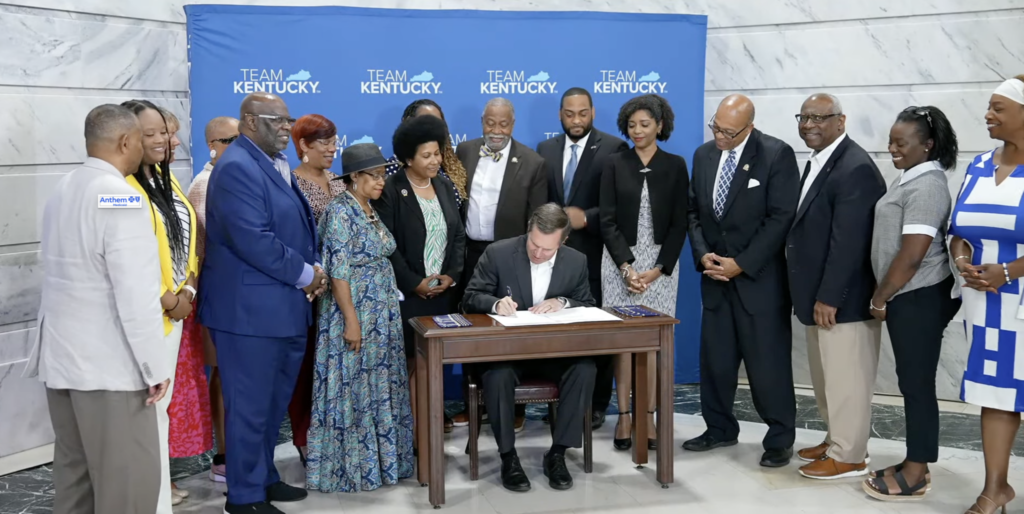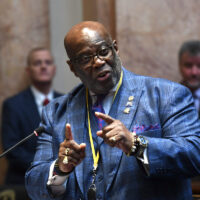Gov. Andy Beshear on Thursday signed executive orders making Juneteenth an executive branch holiday and protecting natural hairstyles like braids, locs and twists from discrimination.
Both Democratic and Republican lawmakers have tried and failed to pass bills on both of these issues.

Sen. Whitney Westerfield, R-Fruit Hill, is among those who have championed the CROWN Act, which is an acronym for “Creating a Respectful and Open World for Natural Hair.” His latest bill stalled this session after being passed over in the Senate several times and recommitted to the Judiciary Committee.
Democratic Floor Leader Sen. Gerald Neal, D-Louisville, also filed a bill this session to make June 19 — Juneteenth — a state holiday. It did not get a hearing.
The Juneteenth executive order
Juneteenth became a federal holiday in 2021, commemorating the day in 1865 when the last enslaved people in the United States learned they were free in Galveston, Texas. President Abraham Lincoln had signed the Emancipation Proclamation two years earlier, in 1863, but it was not immediately enforced in many areas of the south.
“I’ve decided I can no longer wait for others to do what is right,” Beshear, a Democrat, said Thursday ahead of signing the order.
“It is our responsibility to look back at one of the ugliest chapters in our history. We must look at it straight on and not hide from our own history, even the parts that are painful.” Beshear said. “Instead, we recognize it, we attempt to learn from it and we work to repair the lasting damage and heal our nation’s wounds so we can make progress for a better tomorrow.”
His executive order will make Juneteenth an official holiday in Kentucky, in line with actions taken by at least 28 other states, according to the Pew Research Center.

“It is impossible for me to ever fully imagine the horror and lasting scars and legacy of slavery and Jim Crow,” Beshear said during a gathering in the Capitol Rotunda. “But as governor, I’m committed to listening, to learning, to trying to hear and then to take intentional action.”
Neal joined Beshear Thursday. He said Juneteenth symbolizes “both jubilation and a solemn reminder of the struggles and achievements of African Americans.” He has tried for several years to pass a bill codifying Juneteenth and said he’s committed to keep trying.
“I urge my colleagues in the General Assembly to support legislation in the upcoming session, recognizing the pivotal role Black Americans have played in shaping our country,” Neal said. In doing so, “we honor our shared history and demonstrate a commitment to equality and justice for all.”
Natural hairstyles protected
As of 2023, 22 states had enacted CROWN Acts, according to the Legal Defense Fund. The national CROWN Act campaign found, based on a 2023 study, that about half of Black women feel pressured to straighten their hair in job interviews, professional headshots and on the job.

They also found more than a fifth of Black women between 25 and 34 were sent home from their work because of their hair. Additionally, the survey found that Black women with textured hair are two times more likely to report microaggressions at work than Black women with straightened hair.
Beshear’s executive order applies only to state government workers and job applicants. Effective immediately, it prohibits discrimination in state government workplaces based on “traits historically associated with race, including, but not limited to natural hair texture and protective hairstyles, such as braids, locks and twists.”
“The way my hair looks is not a reflection of my work ethic,” said Melinda Wofford, an assistant director in the state’s Transportation Cabinet. “It definitely (is) not a reflection of my character. This order makes possible the freedom needed for me to continue to wear my hair in its natural state, the state that God blessed me with, without fear of discrimination in the workplace.”
This article is republished under a Creative Commons license from Kentucky Lantern, which is part of States Newsroom, a network of news bureaus supported by grants and a coalition of donors as a 501c(3) public charity. Kentucky Lantern maintains editorial independence. Contact Editor Jamie Lucke for questions: info@kentuckylantern.com. Follow Kentucky Lantern on Facebook and Twitter.
Sarah Ladd is a Louisville-based journalist and Kentuckian. She has covered everything from crime to higher education. In 2020, she started reporting on the COVID-19 pandemic and has covered health ever since.






